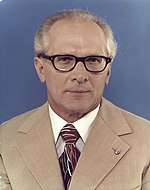Neunkirchen, Saarland
Neunkirchen (German: [ˈnɔɪ̯nˌkɪʁçn̩] (![]()
Neunkirchen | |
|---|---|
 View of the town | |
_COA.svg.png) Coat of arms | |
Location of Neunkirchen within Neunkirchen district   | |
 Neunkirchen  Neunkirchen | |
| Coordinates: 49°21′N 7°10′E | |
| Country | Germany |
| State | Saarland |
| District | Neunkirchen |
| Subdivisions | 10 Stadtteile |
| Government | |
| • Lord Mayor | Jörg Aumann[1] (SPD) |
| Area | |
| • Total | 75.08 km2 (28.99 sq mi) |
| Elevation | 252 m (827 ft) |
| Population (2018-12-31)[2] | |
| • Total | 46,469 |
| • Density | 620/km2 (1,600/sq mi) |
| Time zone | CET/CEST (UTC+1/+2) |
| Postal codes | 66538–66540 |
| Dialling codes | 06821 |
| Vehicle registration | NK |
| Website | www |
Overview
The name of the town derives from "An der neuen Kirche" meaning "by the new church" not from "nine churches" as one might be tempted to assume. In the past, Neunkirchen's economy has been shaped almost exclusively by coal and steel. With the decline of this industry sector, Neunkirchen's economy had to face drastic changes and underwent a significant shift towards the service and retail sector, although smaller industries still remain.
History
Early history

The earliest settlements in the area can be dated back to 700 BC. The oldest part of the town is the village of Wiebelskirchen north of the town centre; its name has been recorded as early as 765 AD and is thus the oldest Christian name in town ("Kirche" means church). The name "Neunkirchen" is recorded for the first time in 1281.
Neunkirchen belonged to the principality of Nassau-Saarbrücken, who erected two castles nearby (which do not exist any more today, but the ruins of one of them are the base of a little park-like area.
The famous German poet, geologist and author Johann Wolfgang von Goethe visited Neunkirchen and described the Castle and the Ironworks.
Weimar Republic
Neunkirchen was awarded township as late as 1922 after having been the largest village in Prussia for some time.
Nazi era and World War II
On 10 February 1933, an explosion of a giant gas tank at the ironwork caused 68 casualties, 190 injured. The damage spread over a part of the factory and also hit a nearby residential area and a school building. The duration of repair work and temporary closing of the damaged parts of the iron works was about nine months. This event caused worldwide media attention.
Having a big ironworks complex right in the town centre made the town a target for Allied bomb raids in the Second World War. In 1945, an air raid destroyed about three quarters of the town centre. Due to that, there are many malfunctioning WW2 bombs that didn't explode and can be found even today.
Post World War II
On September 10, 1987, General Secretary of the Socialist Unity Party Erich Honecker visited his birthplace Neunkirchen.
Economy
There are traces of surface coal mining that reach back as far as 700BC. Later on, coal was mined underground until 1968. In 1593, the first ironworks were constructed in the Blies valley. The iron ore used was from local origin.
Much of the city's fate was influenced by the von Stumm-Halberg family, who owned the local ironworks from 1806 onwards, and thus had enormous influence on the local politics.
Due to the decline of the coal and steel industry, the local economy faced aggravating hardships. With the last coal mine closing down in 1968 and the major part of the ironworks complex closing down in 1982 (only a steel-mill is still in service today), the unemployment rate rose drastically.
Meanwhile, the city has transformed into a "shopping town", a process that had been started with the construction of a large shopping centre on the grounds of the former steelworks.
Remnants of the former steelworks that had not been destroyed meanwhile have been preserved and renovated. They now serve as an industrial monument; parts of them feature small pubs, clubs, a cinema, the first of the German branch of Hooters of America, Inc restaurants and a radio studio of the McDonald's fast food chain.
Personalities

Erich Honecker, (1912-1994), General Secretary of the Socialist Unity Party of East Germany from 1971–1989, and Chairman of the Council of State of the German Democratic Republic from 1976–1989, was born in Neunkirchen and later moved to Wiebelskirchen, a village that belongs to the city of Neunkirchen, but sits a little outside of the inner city area.
Sons and daughters of the town
- Erich Honecker (1912-1994), Leader of East Germany 1976-1989
- Julius Adler (politician) (1894-1945), politician Member of Reichstag (KPD)
- Walter Rilla (1894-1980), actor
- Karl Rawer (1913–2018), physicist
- Karl Ferdinand Werner (1924-2008), historian and longtime director of the DHI Paris
- Wolfgang Kermer (born 1935), Professor of art history and longtime rector of the State Academy of Fine Arts Stuttgart
- Stefan Kuntz (born 1962), football player and coach
- Thomas Hayo (born 1969), advertiser
- Alexandra Kertz-Welzel (born 1970), Professor of Music Education at LMU Munich
- Shanta Ghosh (born 1975), athlete
- Tobias Hans (born 1978), politician (CDU)
- Nora Gomringer (born 1980), Swiss-German lyric writer, reciter and winner of the Ingeborg Bachmann Prize 2015
- Johannes Wurtz (born 1992), football player
City twinning



References
- https://www.neunkirchen.de/index.php?id=stadtverwaltung&L=1&L=1
- "Saarland.de – Amtliche Einwohnerzahlen Stand 31.12.2018" (PDF). Statistisches Amt des Saarlandes (in German). June 2019.